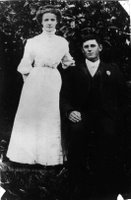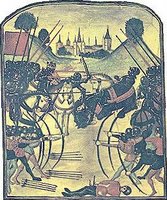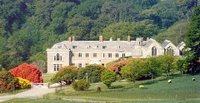Murray Hicks 1913 - 2002: Rural life 1910s: Our house
I was born in January 1913. Probably my earliest memory was of being in a box lined with an rug in the milking shed while my parents [Hilda and Harold Hicks]
 milked the cows by hand. I was not then able to climb out of the box but I could see over the top. I guess that must have been about late 1914 or so.
milked the cows by hand. I was not then able to climb out of the box but I could see over the top. I guess that must have been about late 1914 or so.Our farm, of about 53 acres, was situated on Ngatimaru Road, Tikorangi, about two and a half miles from Waitara, and the house, unlike most in the district, was close to the road - I assume because the ground there was a little higher than the land.
Hilda (Cole) 1885-1966 and Harold George Hicks 1885-1952
The farm and the house (believed to be then of only two rooms) was given to my father by his grandfather, Richard Hicks [1824-1918] at the time my father and mother were married in 1908. In return, my parents were required to provide for the grandfather as long as lived.
At my earliest memory of our house, it was T-shaped with three bedrooms and a relative large living room. There was a verandah around three sides of the bedrooms and a small verandah on the road side of the living room.
The first bedroom was my parents’, about 9 feet by 9 feet with a dressing table (with mirror) across the corner to get good light from the windows on two sides. What with the double bed, my fairly large cot on one side of the bed and a table with washbasin on the other there was just comfortable room to move around. On one wall there was a picture (Faith Hope & Charity), three rather ethereal looking ladies.
The second bedroom was probably about nine feet long and seven feet wide. Having only one window and a verandah outside made the room rather dark.
The third bedroom was fairly large with windows on two sides. Because the living room was only as wide as the passage plus the second bedroom, access to the third bedroom was through a small built out elbow-shaped room ( I can remember pantry shelves and bacon hanging from the ceiling). From the construction of the third bedroom, it was added some time after, possibly when my parents were married. I can vaguely remember my great grandfather being here. He slept in it and seemed to spend most of his time there. He must have passed on when I was about two or three years old.
The living room had a window and the front door facing the main road, where a path led through the garden to a wooden gate. One end was mainly taken up with the Shacklock range. This had a small water heater at one side which supplied hot water, and was kept going nearly all the day. There was always a kettle on the range for tea etc. In the winter the stoking doors were left open to throw the heat out in the room so we were rarely cold.
Because of a “lean-to” storeroom on the North-East side of the kitchen, that side had no windows bar the back door with two glass panels; it tended to be a bit dark too. The lean-to provided a storeroom for wheat and mash for the fowls and a porch about six feet square where wet weather gear, farm boots and firewood for the range were kept and where we washed our hands before coming inside.
The living room served as kitchen, dining room, and entertaining space. The kitchen table was my mother’s work bench when she was cooking, then the dining table, then the washing up bench after that. When we had visitors, it was the entertainment base.
The outside walls were rusticated horizontal boards painted white. The roof was corrugated iron, but not painted as the roofing iron did not rust very easily in those days.
The interior had varnished tongue and grooved boards on the lower four feet of the walls and wallpaper over scrim above that. The ceilings were about 10 feet high, not as high as most about the area, and were of wide painted boards with ornamentally grooved battens.
There was no electricity in the district outside the Waitara Borough; our lighting came from the kerosene lamp in the living room. Otherwise, only candles.
We had no running water, no bathroom, inside toilet nor drainage system. Our Saturday night baths were in the small storeroom by the light of one or two candles. We used the galvanised tub used by my mother for washing the clothes each week. The water was heated on the range in a kerosene bucket.
All waste water was thrown out into the shrubs over the veronica hedge about five yards from the back door. The ground was good loam and the water soaked away very easily. Meat scraps were given to the cats (two or three white ones) or to the farm dog who had his kennel by the sheds. The vegetable scraps were thrown over the hedge where they were cleaned up by the fowls, which were allowed to run loose over the property.
The toilet, furnished with only a seat over a large paint drum, and some newspaper, was discreetly situated under a laurel tree about 15 yards from the back door.
The house itself was on about an acre of ground surrounded on three sides by lawson hedges, about seven or eight feet high. At my earliest memory, the side facing the side road had a newly planted golden ake ake hedge about 18 inches high. There were large laurel trees, about 15 feet high, dividing the house acre in two. These trees were probably planted about 1900 to give shelter from the Southerly wind when the house was first built. I enjoyed playing in them very much.
A smaller laurel hedge ran almost to the back door. This made a sheltered area for the clothes line and a play area for me and my sister. The grass was rather long except when my father cut it with a scythe.
About ten yards from the back door were the tool shed and the cart shed; neither painted. Behind the sheds was my mother's laundry: a copper boiler on the open ground with two galvanised tubs nearby. The two tubs (the smaller tub being used to blue the clothes) were shaded from the sun by large pear tree. On washdays (mondays unless it was raining), my mother had to carry cold water from our only tank by the house, fill up the copper boiler and light a fire under it. Then she would fill it with the dirty clothes plus soap. When the water was boiling some of the clothes and hot water were transferred to the larger galvanised tub where they were scrubbed on the washboard and rinsed and then wrung out with the hand wringer. White clothes also had to go through the blue tub process. Waste water was emptied into a hollow where it quickly soaked away in the black soil.
Between the laundry area and the lawson hedge was quite a good orchard of apple, pear and plum trees plus a walnut and a chestnut tree. The chestnut tree didn’t seem to bear any fruit but all the others did. The trees were never pruned, manured or sprayed, and over the years their fruiting greatly reduced but in my early days they seemed to fruit very well. A second orchard on the South side was obviously planted much later but these trees had hardly any fruit.
We had no refrigerator; the safe on the outside wall seemed to be effective but it was not large and was not accessible from inside the house.
At first the butcher used to call once a week but later we had to get our meat by favour of the grocer, who was very obliging. He delivered our order once a week and included our meat. Bread was not sold by the grocer but was available from the bread cart which also called weekly.
Dad used to go to Waitara each Saturday afternoon (walking or on horseback), taking in the order for the following week. (Dad used to play football for the Clifton Rugby Football Club and there were many of his football photos on the walls.) We had no telephone but were able to phone up the orders from the Wills, about 150 yards away. We tried not to impose on them too much.
We had no radio until many years later; the Taranaki Daily News was delivered daily.
There was no reticulated water system in the early days and we had only a smallish tank (probably 400 gallons) which was replenished by roof catchment for all the household needs. When the tank got near empty, Dad would be frequently tapping it to measure how much was left. The water was then brackish but we had to conserve it as much as possible.
My mother was a very keen gardener and seemed to find time to look after her garden. In later years especially, through swapping cuttings with her many garden visitors, my mother had many very rare varieties of flowering plants. However, even in those early days I can remember my Aunt Olive and others, getting flowers from us when wanted for a wedding or a funeral.




